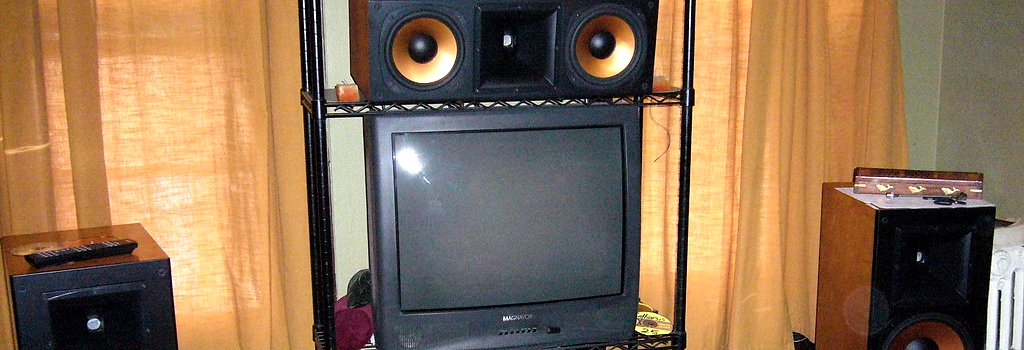In the home theater environment, it’s often said that sound is 50% of the experience. A big picture needs to be matched by equally big sound. Is that really true, though? Many viewers will find themselves prioritizing one aspect over the other, depending on their personal preferences and needs. Where do you fall on this scale?
I’ve always been a videophile first and foremost. While I recognize the importance of audio quality, and have dutifully upgraded my theater room to lossless 7.1 surround sound with what I consider to be respectable gear, I have certainly not spent as much on audio equipment over the years as I have on video. If it really comes down to it, I can tolerate mediocre sound quality on a delivery format (like, say, instant streaming from the internet) much more than I can tolerate even minor video flaws. I find myself much more engaged with a movie’s visuals than I do its sound. When I get really wrapped up in a movie, I tend not to even notice the sound. The times that I do notice it generally means that something is really wrong with it.
On the other hand, I know people who prioritize optimum audio fidelity above all else, and would watch a movie in artifact-ridden standard definition if it had a great soundtrack.
What’s your priority in a home theater system?






Alex
I’m saying video, but only barely. That doesn’t mean that I’m willing to accept the built-in plasma speakers. A home theater definitely needs some quality sound that prevents its viewer from ever getting kidney stones, but I’d rather spend my upgrade money on a wicked cool screen than a sound system that provides me an extra couple of Hz-worth of frequencies to hear.
javier
I say they are both equal. You can’t have big picture with tiny sound. I have spent more on my sound than on my video because I think it takes more to have really good sound. There’s so many pieces that need to be in place.
Aaron Peck
I picked video, not because I think that, but many Regular Joes think that.
Every person I’m acquainted with that loves watching movies, but might have a tight budgets, ALWAYS buys a nice TV before they ever think of buying a nice sound system.
Quality visuals seem to always take priority when people are planning out their home theater upgrades.
Alistair Paterson
If I had the choice between poor Picture quality and great sound or good picture quality and mono sound then I would choose good picture quality.
Having said that and like javier I have spent more on my sound system than I have my TV. however 7 speakers, sub, amp, speaker cable and interconnects can be brought and upgraded individually whilst a TV has to be brought in one solid lump.
JM
My friend once showed me ‘Braveheart’ on a 13″ TV, with a $10K sound system.
I just rewatched ‘The Raid’ trailer, with my crappy iMac built-in speaker.
It feels like the emotion of a film comes from, maybe, 60% audio, 40% video?
August Lehe
I say one third “Great Picture”
one-third “Sharp/clear voices”;
& one-third “directionality and musicality”…so…I voted “Great Picture.”
OK, I’m a coward, too!
Chad Sachs
Bad video is easier to ‘See” than it is to “hear’ truly bad audio.
Bad video makes my eyes bleed
RBBrittain
I voted “video” but I think it’s 60% video, 40% audio. Lossless audio is important on modern soundtracks; but once you see true 1080p you can never go back to SD.
Vince Duggan
Once you see Blu-ray, you’re spoiled. Once you hear Blu-ray, spoiled again. That being said, I’ll admit to enjoying NFL games more on CBS than on Fox because the surround is much better.
Jon D
I’ve always been an audio guy, ever since my mid level 5.1 system was paired up with a 21″ CRT.
M. Enois Duarte
I would say both are fairly to close to equal in my books, but I admit to giving audio a slight edge. Like others, I spend more time and money on the audio than the video, which obviously says a lot.
Personally, I don’t just watch movies; I want them to live, from sound effects to music (diegetic or non-diegetic) and everything in between. I suppose that would make me a cinephile above all else.
EM
The all-in-one unit that is the primitive basis of the simplest of home theaters is called a television, not a teleaudition or a teleaudiovision. The telecast programs we watch on them are often called shows.
The term show is also sometimes used for the programs at “real” (non-home) theaters. The theatrical shows that most commonly are replicated in home theaters are frequently called movies, a term which derives from moving pictures; they are also sometimes called motion pictures. The term cinema derives from a Greek word that means “motion”; as with movies, the etymology implicitly refers to the motion of images, not of sounds. Indeed, the word theater itself ultimately derives from Greek words meaning things like “viewing” or “seeing”.
Experiencing a movie or TV show is called watching or seeing or looking at it. If the program includes sound (as it almost always does), use of the aforementioned verbs usually implies listening to the program as well. On the other hand, to simply say that one heard or listened to a movie or TV show is to imply only a fragment of the usual sensory experience.
There is a term talkie which emphasizes the audio aspect of a movie, though the term is usually restricted to the historical context of the transition to talkie technology or the contrast with pre-talkie technology and/or style, which is usually called silent to emphasize a dearth of audio. Normally neither term is used for other audio or non-audio media (e.g., paintings are usually not classified as silents; stage plays replete with dialogue are not usually classified as talkies)—silents and talkies are subclasses of movies or motion pictures or cinema. Note that the abovementioned historical transition is conceived of a transition from moving images without sound to moving images with sound, as opposed to a transition of sound without moving images to sound with moving images.
Since so much of our language and our very conception of our home theaters’ A/V content and technology clearly places the visual aspect in primacy above the audio aspect, it shouldn’t be surprising if in our home theaters there is a tendency for sound not to be prized above sight.
JM
TV was named Television in 1900.
The etymology is a Greek-Latin hybrid, tele-visio, meaning “far sight.”
They called it that because, with 30 lines of resolution at 5 frames per second, in order to enjoy it you had to very far back.
So even with the first TV, audio was more important.
M. Enois Duarte
Even silent films weren’t exactly void of sound; they have a musical accompaniment. Otherwise, they’d be completely dull and uninteresting.
Try a little experiment: Watch the invasion of Normandy scene from ‘Saving Private Ryan’ or “Ride of the Valkyries” scene from ‘Apocalypse Now’ in mono and see if that doesn’t alter your perception of the visuals. No matter how pretty the image may be (Blu-ray, DVD or theatrical showing), sound is a major component to the enjoyment and experience of cinema.
A person not putting much emphasis on their sound system at home is one thing, but anyone implying sound is a small or even insignificant part of a film is making a ridiculous argument. And by sound, I’m also including musical score and song selections. ‘King Kong (1933)’ proved the value of an original score to accompany the visuals, which are often the most dramatic parts of a movie.
Josh Zyber
AuthorThe question here isn’t meant to suggest that sound quality isn’t important at all, but rather to ask whether it’s AS important or MORE important than the visual quality.
Personally, while I love my lossless surround sound rig, I could still very easily enjoy a movie just as much in a room with only a modest stereo system consisting of a soundbar or HTIB speakers (even, heaven forbid, Bose!), playing a lossy Dolby Digital track. Whereas the best audio system in the world could not get me to enjoy that movie on a 20″ standard-def TV like the one pictured in the banner image.
A lot of the art-house theaters near me are barely equipped for stereo, much less surround sound. I have no problem seeing movies there so long as the screen is decent.
M. Enois Duarte
And I totally get that. I’m only responding to the implications of EM’s comments.
I’ve been to several art-house theaters with sub-par audio and barely a decent screen. It’s never really been an issue as far as I’m concerned because the type of films usually shown in these theaters are dialogue-driven. But if the clarity of the dialogue and conversations between characters is ruined and you can’t make out what’s being said, then this tends to ruin the experience and enjoyment of the movie itself, no matter the quality of the picture.
Personally, the two (video and audio) are inseparable and have become so since the introduction of non-diegetic background music as early as the silent shorts from the turn of 20th Century. Again, this is only to my own personal tastes and preferences. I do love good audio, from a dialogue-centered monaural soundtrack to the full-blown surround-sound spectacular.
Josh Zyber
AuthorPerhaps we should set a ground rule that this decision assumes at least a base level of competence in both audio and video. Speakers so bad that you can’t make out the dialogue would be unwatchable, as would a projector lamp so dim you can’t see what’s happening on screen.
EM
I think anyone arguing that the claim “it shouldn’t be surprising if in our home theaters there is a tendency for sound not to be prized above sight” implies the claim “sound is a small or even insignificant part of a film” is making a ridiculous argument.
JM
Would you enjoy a 150″ 8K plasma with built-in 2-watt speakers?
Hook that up to a $400 HTIB and you’ve got an epic home theater.
A mono-quality art-house has the advantage of a live communal audience, which can often enhance a movie more than the soundtrack.
For me the real conflict is quality vs decor.
I’m tempted to switch from 6.1 to a soundbar just to make the room sexier.
William Henley
I said both are equally important, but I think I kinda lean toward audio being more important. but I am talking like 50.1/40.9. Sadly, right now, I am in a temporary place, so I am not hooking up the surround sound system here, just to unhook it in a month or two. Of course, I am also dealing with an SD signal because I don’t want to pay the extra at the moment to get the HD box. I will probably hook up the PS3 tomorrow, so at least I can watch my Blu-Rays, but it is just annoying watching movies on the TV speakers
motorheadache
I’m definitely in the video camp, though I like to have at least decent audio. I bought a stereo receiver and VCR when I was thirteen and I’ve never listened to built in tv speakers since.
That being said, I still would favor video over audio. While I have a modest lossless 5.1 setup, I actually more often than not watch movies and shows late at night with my headphones. Also, I tend to base my double-dipping of catalog Blu-Ray titles based on transfer quality and not so much the audio upgrade.
Barney Stinson
50/50 I believe
Just try to imagine Star Wars for a moment – I’ll just bet you heard the music in your head didn’t you?
Maybe HD audio over DTS/DD isn’t that important though, at least not important enough to replace any good existing amplifier with DTS/DD yet.